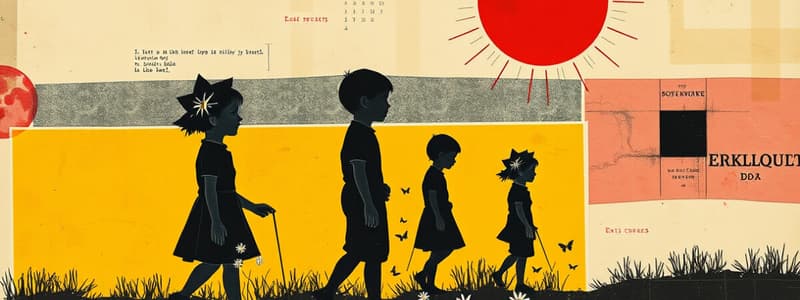Podcast
Questions and Answers
What is the impact of too much adult-directed activity on children's intrinsic motivation?
What is the impact of too much adult-directed activity on children's intrinsic motivation?
- It reduces their ability to evaluate their own work.
- It enhances their concentration and confidence.
- It leads to damaged dispositions, impacting intrinsic motivation. (correct)
- It helps children develop initiative.
Which aspect of the initiative stage is emphasized as children progress in their development?
Which aspect of the initiative stage is emphasized as children progress in their development?
- Product over process in goal-oriented projects.
- Children lose interest in creative expression.
- Self-evaluation and perseverance become essential. (correct)
- Peer collaboration becomes less important.
According to Erikson, how does play contribute to children's development in middle childhood?
According to Erikson, how does play contribute to children's development in middle childhood?
- It only serves as a source of entertainment.
- It supports the development of adult roles and responsibilities. (correct)
- It becomes irrelevant as they grow older.
- It hinders cognitive competencies.
What do children in Leslie's second-grade class do as part of their playwriting project?
What do children in Leslie's second-grade class do as part of their playwriting project?
What can be inferred about cultural expectations during the middle childhood stage?
What can be inferred about cultural expectations during the middle childhood stage?
What is the primary psychosocial task for children during their second and third years of life?
What is the primary psychosocial task for children during their second and third years of life?
How did Ethan’s mother support his autonomy during play?
How did Ethan’s mother support his autonomy during play?
What does Erikson's 'play stage' signify for preschool children?
What does Erikson's 'play stage' signify for preschool children?
What can lead to feelings of shame and doubt in toddlers, according to Erikson?
What can lead to feelings of shame and doubt in toddlers, according to Erikson?
What common play theme is often observed in early childhood?
What common play theme is often observed in early childhood?
Which factor is essential for the development of initiative and independence in young children?
Which factor is essential for the development of initiative and independence in young children?
What does William’s situation with the plates illustrate about child development?
What does William’s situation with the plates illustrate about child development?
How can overly structured learning environments impact children's initiative?
How can overly structured learning environments impact children's initiative?
What psychological outcome does Erikson associate with successful navigation of the play stage?
What psychological outcome does Erikson associate with successful navigation of the play stage?
At what age do children typically enter Erikson's 'play stage'?
At what age do children typically enter Erikson's 'play stage'?
What is the main focus of Erikson's psychosocial theory regarding childhood development?
What is the main focus of Erikson's psychosocial theory regarding childhood development?
Which stage of psychosocial development is characterized by the balance of trust and mistrust?
Which stage of psychosocial development is characterized by the balance of trust and mistrust?
How does Erikson's theory differ from Freud's psychoanalytic theory?
How does Erikson's theory differ from Freud's psychoanalytic theory?
What role do teachers play according to psychosocial theory in early childhood education?
What role do teachers play according to psychosocial theory in early childhood education?
What does Erikson suggest is critical for the development of a sense of trust in infants?
What does Erikson suggest is critical for the development of a sense of trust in infants?
What can be inferred about healthy individuals and the balance of psychosocial strengths?
What can be inferred about healthy individuals and the balance of psychosocial strengths?
What significance does play have in children's emotional development according to Erikson?
What significance does play have in children's emotional development according to Erikson?
Study Notes
Erikson's Play and Mastery in Childhood
- Early childhood years are crucial for emotional development; play is emphasized as vital by Erikson.
- Erikson's theoretical orientation combines "psycho" and "social," highlighting the link between psychological states and social environments.
- Psychosocial theory informs early childhood education, focusing on emotional and social well-being.
- Identity development is influenced by family, school, and cultural contexts throughout different life stages.
Stages of Psychosocial Development
- Erikson outlined eight stages of psychosocial development, building on previous stages.
- Stages are not merely passed through; individuals continuously balance strengths and weaknesses from each stage.
- Trust vs. Mistrust occurs in infancy; a caregiver's sensitivity fosters the infant's trust in themselves and the world.
Infancy: Trust and Mistrust
- Caregiver attachment leads to trust development; a healthy sense of trust aids a toddler's autonomy.
Toddlerhood: Autonomy, Shame, and Doubt
- During ages 2-3, children assert their independence, developing a sense of power through their motor and cognitive skills.
- Autonomy is shaped by boundaries set by adults; positive reinforcement can further enhance a child's confidence.
- The balance of autonomy and doubt fluctuates daily and with various activities.
Early Childhood: Initiative and Guilt
- Ages 4-6 represent the "play stage," where children develop initiative, but may feel guilt if their initiatives are excessive or inappropriate.
- Play becomes more structured and complex, influencing children's emotional growth.
- Children address past failures and conflicts through imaginative play, often embodying roles of heroism or independence.
- Play-centered curriculums promote initiative, while overly directed activities may stifle intrinsic motivation and creativity.
Industry and Inferiority: Middle Childhood
- Children shift from flexible goals to goal-oriented projects, developing perseverance and self-evaluation.
- Cultural expectations shape children’s sense of industry; involvement in chores, literacy, and skills training are common.
- Group projects in classrooms foster collaboration, planning, and imaginative execution, continuing the importance of play in learning.
Studying That Suits You
Use AI to generate personalized quizzes and flashcards to suit your learning preferences.
Description
Explore Erik Erikson's insights on the significance of play in early childhood development. This quiz delves into his psychosocial theory, emphasizing the interconnectedness of psychological states and social contexts in shaping a child's emotional growth. Test your understanding of these pivotal concepts in child education.




